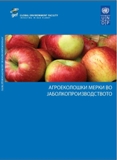Forests
Habitats of European Interest
Forests, woodlands, and scattered trees have provided humans with shelter, building materials, fuel, food, and medicines throughout history. Today, we look to forests for a range of services, such as provisioning of goods and materials (fibre, fuel, food, pharmaceuticals), a range of regulatory services (watershed protection, climate regulation, biodiversity conservation), but also cultural services (recreation, aesthetic enjoyment, peace and inspiration).
Forests in the Prespa lakes basin constitute a wide range of habitat types. Although no habitat type can be regarded as rare at a global level, a number of forest habitat types are classed as habitat types of European interest, including the following:
The thermophilous deciduous woodland of Quercus trojana (ass. Quercetum trojanae macedonicum) which develops on steep, stony terrains up to 1200 metres above sea level. This type of forest habitat is registered along both sides of the road between Djellas and Biglla in Albania, Ramna of Vrondero in Greece, and the area above Oteshevo and Carina in The Former Yugoslav Republic of Macedonia.
Another important forest habitat type which develops in the oak forest zone is the Grecian juniper woods (Juniperus excelsa) which are rare in Europe; their main area of distribution is in the Middle East. In Europe this habitat type occurs only in northern parts of Greece and in The Former Yugoslav Republic of Macedonia, with the Prespa lakes basin being an important site. (e.g., Kallamas in Albania, near Vrondero in Greece, and Golem Grad, Precna Planina and Sirhansko Kale in The Former Yugoslav Republic of Macedonia).
Among the forest habitat types in Pelister NP the two communities of the Macedonian Pine – Molika – stand out: the mountain molika forest (Digitali viridiflorae – Pinetum peuces) and the sub-alpine molika forest (Myrtillo-Pinetum peucis subass. subalpinum). Molika forests are relicts from the Tertiary and in Pelister NP they have been preserved in their primary habitat.
Of the forest habitat types of European interest the well-preserved stand of beech forests (ass. Calamintho grandiflorae-Fagetum and ass. Abieti-Fagetum macedonicum) also need to be mentioned. Important sites for this habitat in the basin are Kalojzana – Neprtka and Volko Legalo in The Former Yugoslav Republic of Macedonia.
How are the forests in the basin currently used?
The current uses of forests and woodland in the basin may be categorized in three groups:
Timber and fuel wood: Wood in the Prespa lakes basin is mainly used for fuel wood, both through legal and illegal cutting. Timber production is of minor importance and mainly restricted to Pelister NP as well as to Prespa NP in Albania. A conservative estimation of the requirements for fuel wood by the population in the basin indicates that the demand may be satisfied locally on a sustainable base. However, the firewood is sold not only to the population in the basin, but also to consumers living beyond the basin’s borders. Thus, in some locations in the basin there could be a high pressure on forest resources. For instance, the inadequate forest management in The Former Yugoslav Republic of Macedonia has led to a reduction of certain plant species used solely as timber.
Fodder: Tree looping for winter fodder production is considered a problem in the Albanian part of the basin, where oak branches are reported to supply 80% of winter fodder requirements. As a result, woodland near the villages shows severe signs of degradation.
Non-timber forest products: The most important non-timber products in the study area are mushrooms, blueberries and cones of the Macedonian Pine (in Pelister NP only). The economic value of these products indicates that there is a pressure on these resources. Illegal hunting is reported to be a problem throughout the basin though no exact figures on hunted game numbers are available.
Project Interventions in Forest Manahem
Within the framework of the transboundary cooperation in Prespa Park, the priority in forest management practices is given to forest restoration, fulfilment of local energy needs, and conservation and enhancement of biodiversity. Special attention is paid to the specific transboundary forests biotopes, and to the support to inclusion of some of the typical forest habitats in the zones of strict protection in the existing protected areas.
In Albania there is a need for active management of degraded forest areas through reforestation, rehabilitation and restoration, as well as control of forest exploitation and the development of alternative renewable energy resources, such as fuel-wood plantations.
Among the priorities for forests management in Greece are the promotion of a variety of forest habitats, improvement of the status of forest fauna, and increasing biodiversity. Illegal woodcutting and woodcutting in a zone of 50m along all streams with steep slopes also present issues to be looked at.





 GEF IW:LEARN
GEF IW:LEARN